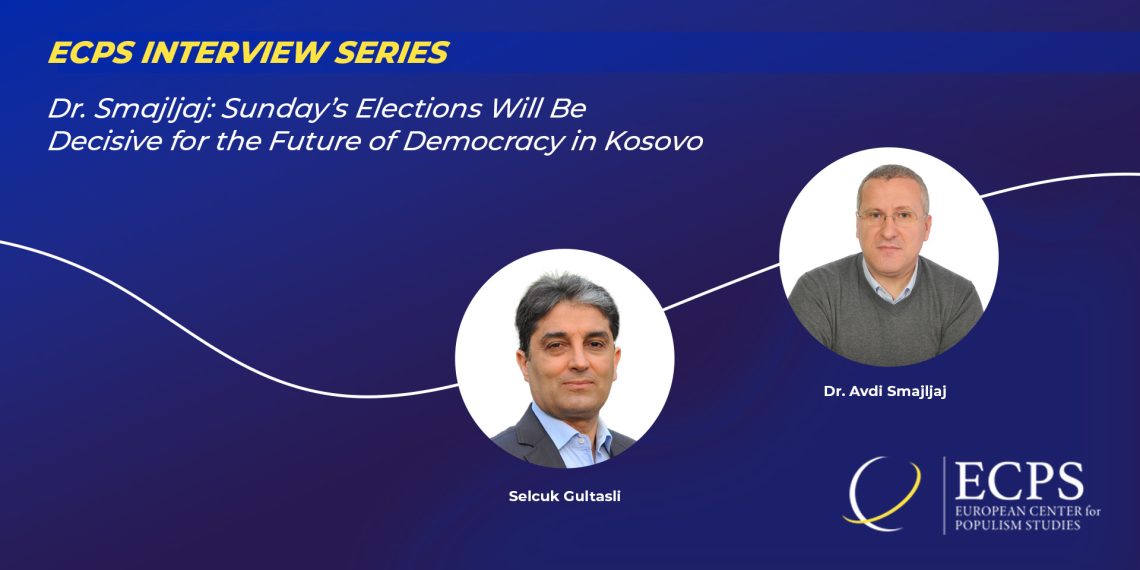As Kosovo heads into a decisive election, Dr. Avdi Smajljaj warns of its significance for the country’s democratic trajectory. “The upcoming elections this Sunday will be crucial in determining the future of democracy in Kosovo,” he explains, emphasizing the risk of increasing authoritarian tendencies. Meanwhile, tensions with the EU and US complicate Kosovo’s international standing. “Kosovo’s statehood remains heavily dependent on US support,” he adds, particularly with the uncertainty of second Trump presidency. With growing populism and strained foreign relations, Kosovo’s future hangs in the balance, making this election a turning point for its domestic and international course.
Interview by Selcuk Gultasli
In an insightful discussion with the European Center for Populism Studies (ECPS), Dr. Avdi Smajljaj, a lecturer in Political Science and International Relations at Epoka University, Albania, highlights the significance of Kosovo’s upcoming elections, its evolving relationship with the European Union, and the critical role of US support—particularly in light of a potential second Trump presidency. With Kosovo still in the process of democratic consolidation, the elections this Sunday will be a pivotal moment. “The upcoming elections this Sunday will be crucial in determining the future of democracy in Kosovo. If opposition parties manage to return to power, either alone or through coalitions, this could help prevent further steps toward authoritarianism,” Dr. Smajljaj explains.
A key player in Kosovo’s current political landscape is Vetëvendosje, the ruling party, which has transitioned from an anti-establishment movement to the dominant force in government. Since gaining power, Vetëvendosje has maintained a populist rhetoric that emphasizes anti-corruption, sovereignty, and resistance to foreign interference. However, Dr. Smajljaj notes that the party has also consolidated its control over state institutions, mirroring some of the very practices it once opposed. “The government has increasingly relied on ethno-nationalist mobilization, particularly in northern Kosovo, to maintain public support despite governance failures,” he explains. The party’s initial promises of justice, meritocracy, and institutional reform have been overshadowed by its own efforts to replace existing officials with loyalists, raising concerns about democratic backsliding.
Vetëvendosje’s approach has also influenced Kosovo’s relations with international actors, particularly its stance toward the EU and US. While the government officially supports European integration, its unilateral actions—especially in northern Kosovo—have drawn criticism from both Brussels and Washington. “The Kosovo government has taken what it describes as unilateral actions, leading to diplomatic consequences,” Dr. Smajljaj states. These tensions have resulted in EU sanctions and strained relations with the Biden administration, fueling speculation about how a second Trump presidency might approach Vetëvendosje’s governance style. With populism shaping both domestic politics and foreign policy, the party’s future role will be a critical factor in determining Kosovo’s stability and international standing.
Beyond domestic concerns, Kosovo’s international standing remains highly dependent on the United States, which has historically been its most influential ally. However, a second Trump administration could alter the dynamics of US engagement in the Balkans. “Kosovo’s statehood remains heavily dependent on US support… It remains heavily dependent on increasing the number of recognitions, heavily dependent on possible membership in NATO, and in EU membership as well,” he states. US troops within KFOR serve as the primary security guarantee in the region, and any change in American priorities could have serious consequences. “If there were a decision to minimize US troops in Kosovo or to withdraw them, this would be bad news for the prosperity of Kosovo as a state,” he warns.
Dr. Smajljaj also reflects on past US diplomatic efforts, particularly under the Trump administration, which proposed alternative approaches to resolving the Kosovo-Serbia dispute. “Just before Trump left office, the Washington Agreement was signed, but this agreement was completely ignored by the new government in Kosovo,” he notes. There was also discussion of a controversial land swap deal between Kosovo and Serbia, which, according to some reports, could have influenced Russia and China’s stance on Kosovo’s UN membership. With Trump’s unpredictability and "America First" approach, a second Trump term could bring either new diplomatic strategies or reduced engagement, potentially leaving Kosovo in a precarious position.
At the same time, Kosovo’s relationship with the European Union remains strained. While Kosovo officially supports EU integration, tensions with Brussels and dissatisfaction with the EU-facilitated dialogue process have led to what Dr. Smajljaj calls “implicit Euroscepticism.” “Currently, Kosovo is under sanctions from the European Union, and the United States has consistently blamed the Kosovo government for unilateral actions,” he explains. With both the US and EU at crossroads in their foreign policy approaches, Kosovo faces an uncertain future, making the upcoming elections and potential shifts in global politics more consequential than ever.
In this interview, Dr. Smajljaj provides a critical analysis of Kosovo’s political landscape, the rise of populism, and the uncertain role of international actors, particularly in the face of shifting US policies under a potential second Trump presidency.


